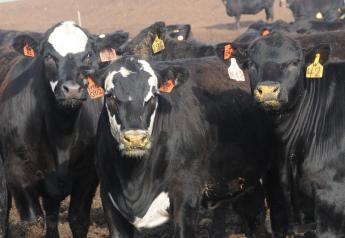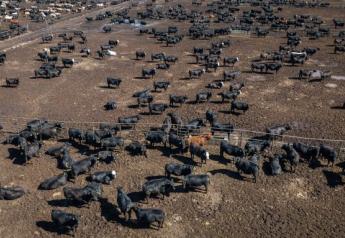Temperament Affects Productivity

No one wants to handle a temperamental cow or bull, but there is more at stake than overall attitude. Temperamental animals are also more at risk for disease, as they are less likely to be treated in a timely manner, according to research studies by USDA-Agricultural Research Service (ARS)’ Livestock Issues Research Unit (LIRU), Mississippi State University and Texas AgriLife Extension.
"We’ve been looking at the effect of temperament on the long-term productivity of cattle—their health and performance," says Jeffery Carroll, animal scientist at LIRU.
"Previous parts of this collaboration indicated that the active immune response of temperamental or high-strung animals were different than that of calmer animals. So the focus of this particular aspect of the study was to evaluate specifically the native immune response of those animals to see if the animal’s temperament would dictate the way it would respond to an immune challenge," he says.
The results were striking. Regardless of breed, animals classified as high strung or temperamental showed virtually no behavioral signs of having an immune challenge and did not develop as much of a fever response. Animals classified as calm animals showed significant behavioral signs that they had been exposed to an immune challenge.
"Temperamental animals can be very tricky to manage. Producers may be missing some sick animals because they aren’t showing the typical signs of sickness," Carroll says.
Additional studies are finding that temperament is developed early in a calf’s life.
"The fact that temperamental animals are more resilient, based on a behavioral standpoint, makes those animals metabolically and ontologically different than calm animals," Carroll explains. "They are diverting more of their available energy to the immune system instead of other production parameters, such as lean tissue deposition or adipose tissue deposition. That is why we typically see real high-strung animals not finish out as well as calm animals."
Ron Randel with Texas AgriLife Extension says his team’s research shows that when cows are stressed repeatedly between 60 and 140 days of pregnancy, there is a strong probability that the gestating calves will be more temperamental and have an altered metabolism.
This prenatal stress, or fetal programming, can affect the calf’s ability to mobilize energy substrates into the tissues and how they clear glucose or other energy compounds from the bloodstream.
"If this fetal programming occurs, you are actually getting a change in the DNA—you are not changing the code of the amino acids, but the groups that are attached to this long strand of DNA that is made up of the amino acids," Randel explains. "You are altering how the DNA functions, not the DNA itself. With this change, what you expect in a way of an EPD in that calf is probably altered or partially invalidated because of the methodology of the DNA itself."
So far, research has shown fetal programming is a possibility in metabolism and temperament, Randel says.
Producers can mitigate stress by maintaining cows in a reasonable body condition score of 5 to 7 and avoiding any repeated transportation or long-term stressor, such as dehorning or branding. Do that before you put the animal into the herd, or wait until the cow has calved.
The next question to study is if those temperamental offspring would pass their altered DNA to the next generation, Randel says. The first prenatal-stressed calves in the study were born in 2012. Once those animals become production age this spring, more research will continue.







